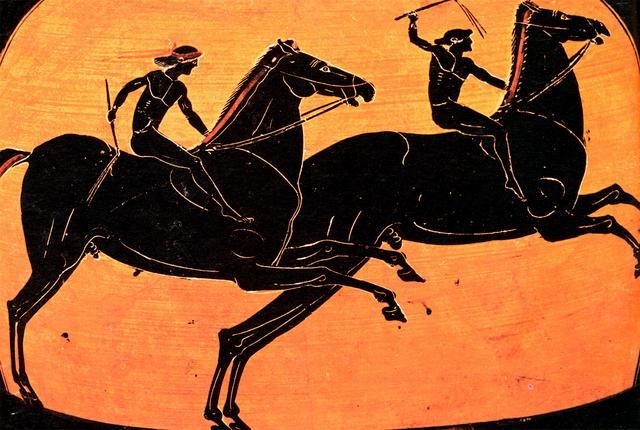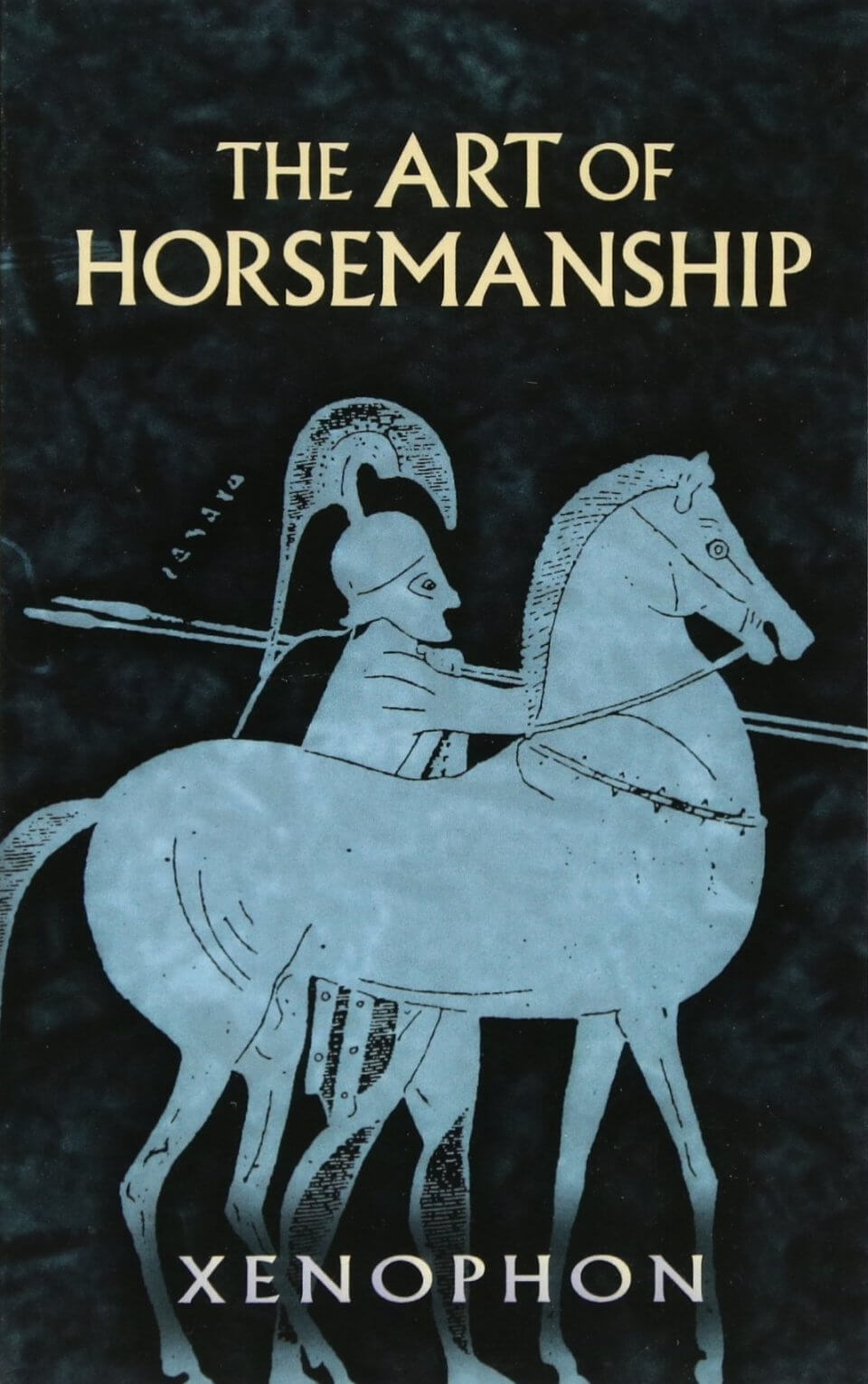
The famous Xenophon, horseman of the ancient world. He is widely considered an expert in horses. His book, The Art of Horsemanship or On Horsemanship has been referenced in many modern guides to horses. The United States Dressage Federation lists it as a suggested reading.
This manual is a classic, written by Xenophon, a Greek historian and soldier who lived from 430 – 354 BC – 2300 years ago. It’s one of the earliest known references on horses.
Although it was written to be applied to cavalry horses, much of what Xenophon writes is still applicable to modern horses. Some of it is questionable, but keep in mind this was written when horses were work animals, not the recreation animals they are today. In war, their training could mean the difference between life and death.
After seeing his book referenced so much, I decided it was finally time to read it. I also became curious about Xenophon himself. Who was this expert on horses in the ancient world?
Early Life
Xenophon grew up in Athens, Greece, born in an aristocratic equestrian household, called the “hippeis.” Horses were a symbol of high social status, mostly owned by the wealthy, and were used for racing, traveling, hunting, and war. The hippeis, being horse owners, were considered the second highest ranking citizens.
Not much is known about Xenophon’s early life. As befitting his station, he likely would have likely received an education and military training, and be able to ride and hunt extensively.
The Ten Thousand
At age 31, he was convinced by his friend to join a group of mercenaries fighting for Cyrus the Younger. He was likely a mid-level leader in the group. The group was called the Ten Thousand.
The mercenaries thought they were to be involved in protecting a minor territory, but they soon learned they were fighting a much bigger battle – going against Cyrus the Younger’s brother, the Persian King Artaxerxes.
After the mercenaries resisted, Cyrus convinced them to continue by promising them a higher pay. In the very first battle against Artaxerxes, he was killed. The mercenaries were left deep in hostile Persian territory without their employer.
While trying to negotiate the group’s safe passage out of Persian, the generals of the group were set up in a trap and executed. The Ten Thousand now had no leader, and the Persians were demanding they lay down their weapons.
Since the Persians were already picking them off, the Ten Thousand was wary about trusting them. The group elected new leaders, one of them being Xenophon. They quickly broke camp and started their escape out of Persian territory. They would end up going across desert, mountain ranges, and rivers, all while being pursued by the Persian army, and dealing with hostile locals.
The history is well documented because Xenophon wrote it himself. Anabasis is an autobiography of his time in the Ten Thousand, from Cyrus’s preparations for war, to the group finally reaching their home Greek territory. Xenophon’s war tactics won him many fans, and Alexander the Great himself used Anabasis as a field guide during the early phases of his career.
A Semi-Retirement

After returning to Greece, Xenophon continued working as a mercenary, but under the Spartan general Agesilaus. His home city of Athens, Sparta’s rival, issued an exile order, and Xenophon never returned to Athens.
He lived near Sparta for the next 23 years, writing most of his works. Eventually, Sparta was defeated in battle in 371 B.C., and Xenophon was driven from his home. He moved to Corinth, which is where he wrote Of Horsemanship.
He spent his time as a philosopher and writer, and was an associate of Socrates. Anabasis is his most famous work (except to horse people), but he wrote other historical records and Socratic works. He also wrote other short treatises in the style of The Art of Horsemanship, detailing the the duties of a cavalry officer and hunting with dogs.
He was known for his simple writing style. The Art of Horsemanship, although not written in modern style, is still an easy read – easy to understand, and fairly short.
Horses
Xenophon was part of an equestrian family, so he likely had a good base of knowledge. Upon entering the Ten Thousand, his knowledge of horses was through the lens of the cavalry horse.
Xenophon himself briefly describes his own qualifications:
It has been my fortune to spend a great deal of my time in riding, and so I think myself versed in the horseman’s art. This makes me willing to set forth to the young of my friends what I believe would be the best way for them to deal with horses. It is true that a book on horsemanship has already been written by Simon […].
Still I shall not strike out of my work all the points in which I chance to agree with him, but shall take much greater pleasure in passing them on to my friends, believing that I speak with more authority because a famous horseman, such as he, has thought I do. And then, again, I shall try to make clear whatever he has omitted.
Xenophon, The Art of Horsemanship
Basically, “Simon* is good, and he wrote a pretty good book on it, but he and I agree, so here’s my version.”
* Simon of Athens, also wrote on horses, but only fragments of his work remains.
His overall philosophy on training horses put the horse as a partner, rather than an object.
Of Horsemanship goes into selecting a horse, training a horse (have someone else do it, one of my favorite lines), caring for the horse, and riding the horse.
He also describes the equipment used. Since they didn’t have saddles or stirrups, they are not mentioned, and I am very impressed they did all their riding without them. They had the equivalent of a bareback pad. They must have had impressive core strength!
Of Horsemanship, as well as his other works, are not held by any copy write laws and can be found free online. As someone had to translate them from Greek, it’s possible there’s a few slightly different versions floating around, depending on each interpretation.
The ancient world was very harsh, but Xenophon’s love of the horse comes through in his writing. He really cared about the animal and wanted others to be able to appreciate the horse the way he did. It’s incredible how much of his ideas from 2300 years ago are still applicable today.
Xenophon had a lot to say about horses


Xenophon on Young Horses - An Equestrian Life
[…] up on the previous post about Xenophon, I wanted to look at what he actually wrote in The Art of Horsemanship. How close is it to modern […]
Xenophon on Caring for Horses - An Equestrian Life
[…] ancient times, minus the ratings. Maybe there’s an extended director’s cut version by Xenophon that also includes ratings. We can only […]
Cynisca: The Spartan Princess Who Was the First Female to Win an Olympic Medal - An Equestrian Life
[…] trying to advance his own political career by associating with her. Cynisca became famous. Even Xenophon, famed horseman, wrote about her. An association with her could boost his own […]
Catherine the Great, Horse Girl - An Equestrian Life
[…] Xenophon […]